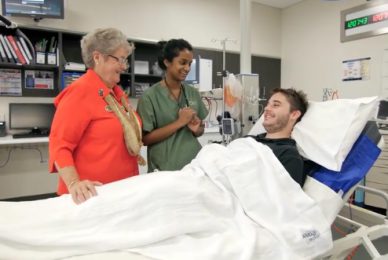Contact Details
| Hours: | 8.00am - 4.30pm Tuesday, Wednesday & Friday |
|---|---|
| Location: | Echuca Regional Health |
| Phone: | 5485 5912 |
What is Advance Care Planning?
Advance care planning is the process of planning for your future health care. It relates to health care you would or would not like to receive if you were to become seriously ill or injured and are unable to communicate your preferences or make decisions. This often relates to the care you receive at the end of your life.
Advance care planning gives you the opportunity to think about, discuss and record your preferences for the type of care you would receive and the outcomes you would consider acceptable. It helps to ensure your loved ones and doctors know what your health and personal preferences are and that these preferences are respected.
Ideally, advance care planning will result in your preferences being documented in a plan known as an advance care directive and the appointment of a substitute decision-maker to help ensure your preferences are respected.
When you appoint a medical treatment decision maker, you are choosing a trusted relative or friend to manage your health care. The person you appoint becomes your substitute decision-maker if you are no longer able to make decisions.
Who should consider Advance Care Planning?
All adults may wish to consider advance care planning. It is however, especially relevant for people with a chronic illness such as lung or heart disease, the healthy elderly and people with other serious and life threatening illnesses such as dementia, cancer and stroke. While well and health, it can be hard to think about treatments that might never be required, but like can change in an instant and difficult medical decisions may need to be made about you. For example, what if you were involved in a car accident, suffered a brain injury and were not going to make a full recover. If you were unable to make medical decisions when needed, who would you like to speak for you and what should they decide? These are the benefits of advance care planning.
What steps are involved with Advance Care Planning?
Advance Care Planning can involve all or some of the following steps:
- Think about your past health experiences
- Think about your beliefs, goals and values that are important in your life.
- Think about your current health and possible future health problems.
- Think about what you would want from future medical care.
- Talk to your family and those close to you about these issues.
- Talk to your doctor.
- Choose a medical treatment decision maker to make medical decisions for you if you are unable to do this for yourself – in Victoria this is best done by appointing a Support Person and/or Medical Treatment Decision Maker (who becomes your agent).
- Meet with your agent and an Advance Care Planning Facilitator.
- Work with the Advance Care Planning Facilitator and your agent to write down your preferences in an Advance Care Directive.
- Provide copies of your Advance Care Plan to your family, your agent, hospital and local doctor and anyone else who you feel is appropriate.
- Review your plan as circumstances change.
Advance Care Planning documents are only ever referred to if you are unable to communicate or make informed decisions.
The original Advance Care Planning documents are held by you with copies held with Echuca Regional Health, your Support Person, your Medical Treatment Decision Maker, your GP and other applicable health care facilities and doctors you wish to provide copies to.
We recommend that they are stored in a safe but easily accessible, with a photocopy attached to your fridge so that Ambulance paramedics can easily access your Advance Care Plan when needed.
To proceed, talk to your General Practitioner or Practice Nurse about completing the Advance Care Planning process.
External Links
Click on the links and download these documents to get started;
Departments and Services Outpatient Services and ERH at Home Advanced Care Planning






